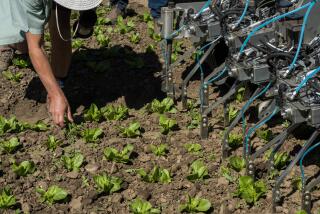Hope, Concern Sprout Over Biotech Crops
- Share via
WASHINGTON — There’s a little touch of revolution in Jim Galloway’s 2,600 acres of corn and soybeans outside Noblesville, Ind., this fall. Like other farmers, Galloway is harvesting the first-ever corn and soybean crops from seeds altered through genetic engineering.
The corn has a built-in insecticide. And the soybeans can survive doses of Roundup, a Monsanto Co. weed killer that is intended to encourage soil-saving farming.
The change may pass most Americans by. Federal regulators and most scientists say there’s no reason to label food derived from these novel techniques because the changes are safe and don’t fundamentally alter the plant.
But in the 15-country European Union, where food politics is more hotly debated, there are serious rumblings about possible U.S. exports of the crops, especially among the influential green movement.
“The sensitivity is at an all-time high,” said Ella Krucoff, an EU spokeswoman in Washington.
Genetically engineered cotton, tomatoes, potatoes and squash also are in fields this fall, but corn is king. America’s most valuable and versatile field crop is being grown on 80 million acres.
So far, just 500,000 acres of that are planted with the genetically altered seed. But the number should blossom in coming seasons with the arrival of even more biotech seed varieties.
“We may go total,” said Galloway, meaning a jump from 80 acres to 1,300 for corn.
Corn feeds cattle, chicken and hogs. It sweetens soft drinks. People cook with corn oil. Even aspirin has cornstarch.
And soybeans, grown on 64 million acres, rank closely in value and uses. Nationwide, 1% to 2% of soybean acres were planted with the new seed this year.
It was a good year for Galloway to make comparisons. An unusually wet spring had caused problems with European corn borers, a worldwide pest, in his early planted corn. “They really riddled it,” he said.
The modified corn, programmed to fight the pest, was a picture of plant health. His 215 acres of soybeans stayed weed-free and flourished.
But critics of biotechnology, including Greenpeace, the Union of Concerned Scientists, the Environmental Defense Fund and Jeremy Rifkin’s Foundation on Economic Trends, keep raising questions about the products.
The critics worry about the spread of genetically engineered hardiness to weedy relatives of some crops, as well as the use of antibiotic-resistant markers to determine which young plants have acquired a desired trait.
They also worry about eventual pest resistance to bacillus thuringiensis, a soil bacterium used as a natural pest control, because of its use in the new corn and other crops.
In Europe, which still rejects U.S. beef because the cattle receive growth hormones, the EU has approved the modified soybean developed by St. Louis-based Monsanto. The EU bought about 40% of U.S. soybeans last year.
But merchants, trade groups and others have demanded labeling, which eventually could be required.
And the modified corn has yet to receive the go-ahead after environmental ministers balked last spring, although a decision could be made this year.
Ciba-Geigy Corp., the Greensboro, N.C., developer of the corn, along with biotechnology company Mycogen Corp. of San Diego, wants to peddle the seed in Europe, particularly in France.
It’s still unclear whether rejection would block shipments of grain to Spain and Portugal, the only EU countries to buy much whole corn--about 2 million tons out of a 60 million total export.
Also questionable is whether corn gluten feedwould be rejected.







